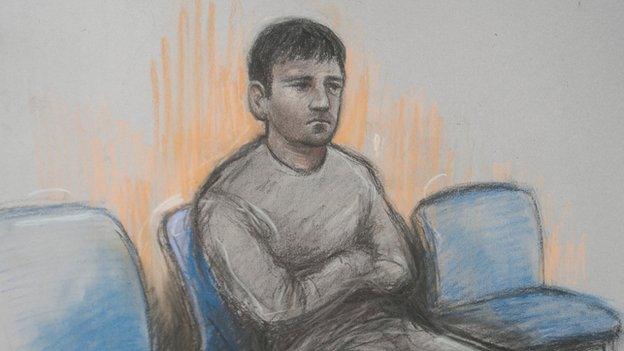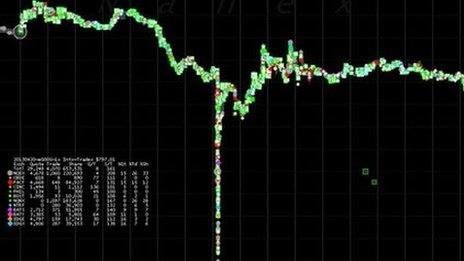'Flash crash' trader loses bail appeal
- Published

The High Court has turned down an application to vary the £5m bail conditions imposed on Navinder Sarao, the trader accused of helping cause the stock market "flash crash".
The decision means Mr Sarao will remain in custody while fighting his extradition to the United States.
Mr Sarao had requested that his bail conditions be relaxed, as his assets had been frozen.
But Judge Ross Cranston turned down his application.
"There's no substantial reassurance that this applicant is not a flight risk," he said.
Mr Sarao, 36, was arrested on a US extradition warrant on 21 April after being charged with wire fraud, commodities fraud and market manipulation by the US Department of Justice (DoJ).
In a bail hearing earlier this month, Mr Sarao said that he "did nothing wrong".
High-frequency trades
However, the DoJ claims, external that Mr Sarao and his firm, Nav Sarao Futures, made £26m ($40m) illegally over five years.

From the court: Andy Verity, economics correspondent, BBC news
Should the so-called "flash crash trader" Navinder Singh Sarao be kept in jail for months pending his extradition hearing?
On the face of it, Navinder Sarao's lawyers have some powerful arguments to make. He has been granted bail. But one of the conditions of bail, a requirement to pay £5m into court as security, is "impossible and unlawful for him to comply with". That, his lawyers say is because of a worldwide freezing order on his assets imposed by a US court.
"He has no money whatsoever," his barrister James Lewis QC told the High Court today. "If it was right in principle to grant bail it must follow that conditions of bail must not amount to a denial of bail."
In spite of vehement protests by Mr Lewis, Mr Justice Cranston went with the US authorities. Mr Sarao now faces the prospect of months in jail before and during the extradition proceedings, which are due to start in September and may last until the new year.
A long spell to spend in jail, considering he was granted bail - though his US accusers will have little sympathy. His lawyers will now try to demonstrate that he does not have assets elsewhere. They will struggle: it's never easy to prove a negative.

Mr Sarao ran the business from his parents' home in Hounslow, west London.
The DoJ accuses him of using an "automated trading program" to manipulate markets, and of contributing to the flash crash of 6 May 2010.
On that day, the Dow Jones index lost 700 points in a matter of minutes - wiping about $800bn off the value of US shares - before recovering just as quickly.
Regulators say one of the main causes of the crash was high-frequency traders placing multiple sell orders.
High-speed trading is where share dealers use computer algorithms to buy and sell stocks in milliseconds.
- Published6 May 2015
